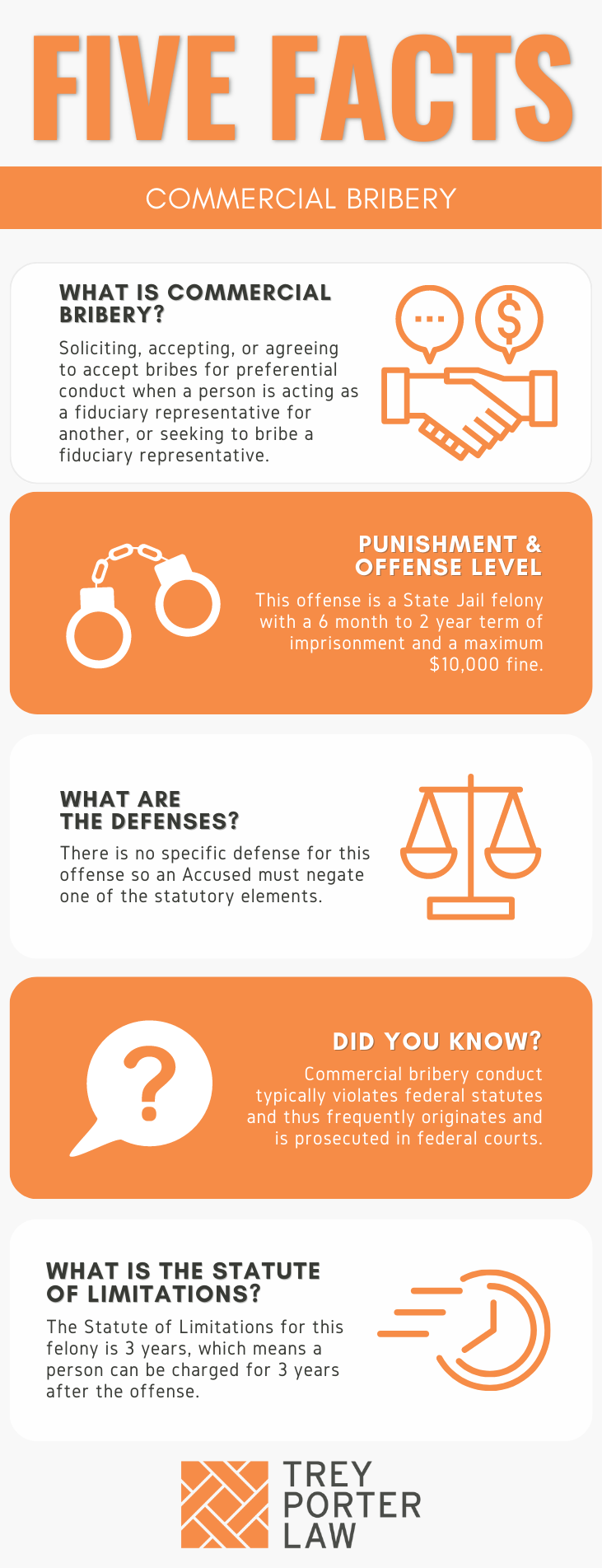WHAT IS COMMERCIAL BRIBERY IN TEXAS?
The Texas law against commercial bribery prohibits a corporation’s or other entity’s trusted fiduciary from soliciting, accepting, or agreeing to accept a benefit from another in exchange for favorable dealings or influence, without authorization from the business, corporation, or other entity. The person who offers, confers, or agrees to confer the benefit may also be charged with commercial bribery.
WHAT IS THE COMMERCIAL BRIBERY LAW IN TEXAS?
Tex. Penal Code § 32.43. COMMERCIAL BRIBERY.
(b) A person who is a fiduciary commits an offense if, without the consent of his beneficiary, he intentionally or knowingly solicits, accepts, or agrees to accept any benefit from another person on agreement or understanding that the benefit will influence the conduct of the fiduciary in relation to the affairs of his beneficiary.
(c) A person commits an offense if he offers, confers, or agrees to confer any benefit the acceptance of which is an offense under Subsection (b).
(d) An offense under this section is a state jail felony.
(e) In lieu of a fine that is authorized by Subsection (d), and in addition to the imprisonment that is authorized by that subsection, if the court finds that an individual who is a fiduciary gained a benefit through the commission of an offense under Subsection (b), the court may sentence the individual to pay a fine in an amount fixed by the court, not to exceed double the value of the benefit gained. This subsection does not affect the application of Section 12.51(c) to an offense under this section committed by a corporation, an association, a limited liability company, or another business entity.
WHAT IS THE PENALTY CLASS FOR COMMERCIAL BRIBERY IN TEXAS?
Commercial bribery is a state jail felony, punishable by 180 days to two years in a state jail facility.
If the accused is a corporation, association, limited liability company, or other business entity not subject to imprisonment, the criminal penalty is the greater of: (1) a maximum fine of $20,000; or (2) double the amount of the monetary benefit the company received from the bribery.
WHAT IS THE PUNISHMENT RANGE FOR COMMERCIAL BRIBERY IN TEXAS?
The punishment range for commercial bribery, a state jail felony, is 180 days to two years in a state jail facility, and a maximum fine of $10,000.
The maximum fine for a corporation or other business entity facing criminal charges is increased to $20,000, or if the entity received a monetary gain as a result of committing bribery, a fine not to exceed double the amount of ill-gotten gains.
WHAT ARE THE PENALTIES FOR COMMERCIAL BRIBERY IN TEXAS?
A person charged with commercial bribery may be eligible for probation after a conviction, or deferred adjudication without a conviction, for a period between two and five years.
If an entity is convicted of commercial bribery, a court may order the corporation or business entity to give notice of the conviction to any person the court deems appropriate.
WHAT ARE THE DEFENSES TO COMMERCIAL BRIBERY IN TEXAS?
The statute does not authorize specific defenses to commercial bribery. A person accused thereof may assert any defense in an attempt to negate at least one of the elements the State must prove at trial. For example, the State must show the accused fiduciary accepted a benefit and agreed to let it influence his conduct in relation to the affairs of his beneficiary, so a person may argue he was not acting in his capacity as a fiduciary at the time he accepted a benefit.
WHAT IS THE STATUTE OF LIMITATIONS FOR COMMERCIAL BRIBERY IN TEXAS?
The limitation period for commercial bribery, a state jail felony, is three years.
COMMERCIAL BRIBERY IN TEXAS
Commercial bribery is offering to confer a benefit or agreeing to accept a benefit as a fiduciary, without the beneficiary’s knowledge or authorization, with the intent to influence the fiduciary’s conduct with respect to the beneficiary’s affairs.
TEXAS COMMERCIAL BRIBERY COURT CASES
The case law regarding commercial bribery in Texas illustrates how these cases are prosecuted at the state level. Generally, commercial bribery cases involve conduct that violates several federal laws, so these crimes are prosecuted in federal court.
- In Adegbenro v. State, the defendant was indicted for offering money to a bank employee, a fiduciary, to give him account numbers of other bank customers. He was convicted of commercial bribery, and the appellate court affirmed. The defendant intended to influence the conduct of the fiduciary to harm the bank without the bank’s authorization or knowledge.













